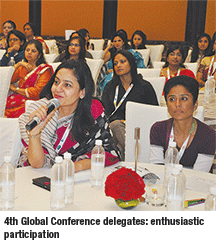Staged against the backdrop of a National ECCE policy having received Union cabinet approval in September last year, the objective of the 4th EW ECE Global Conference was to provide a national platform for international and indigenous experts to share their knowledge and best practices with pre-primary educators from across India. Summiya Yasmeen
.gif) THE 4TH EDUCATIONWORLD EARLY Childhood Education Global Conference 2014 convened at Bangalore’s recently inaugurated Ritz Carlton Hotel featuring a galaxy of early childhood care and education (ECCE) experts from India and abroad, attracted unprecedented response from over 250 promoters, principals and teachers of India’s top-ranked preschools, who packed the swish hotel’s massive 5,700 sq. ft fully-wired conference hall. As in the previous three global conferences staged in Mumbai and Bangalore, the objective of this year’s conference was to provide a national platform for international and indigenous experts to share their knowledge and best practices with pre-primary educators to enable accelerated professionalisation of early childhood education in India.
THE 4TH EDUCATIONWORLD EARLY Childhood Education Global Conference 2014 convened at Bangalore’s recently inaugurated Ritz Carlton Hotel featuring a galaxy of early childhood care and education (ECCE) experts from India and abroad, attracted unprecedented response from over 250 promoters, principals and teachers of India’s top-ranked preschools, who packed the swish hotel’s massive 5,700 sq. ft fully-wired conference hall. As in the previous three global conferences staged in Mumbai and Bangalore, the objective of this year’s conference was to provide a national platform for international and indigenous experts to share their knowledge and best practices with pre-primary educators to enable accelerated professionalisation of early childhood education in India.
The day-long conference, sponsored by Navneet Education, Popcorn Furniture, SMART Technologies and Afairs Media & Exhibitions, featured two keynote addresses and two panel discussions. The first keynote ‘Latest trends and developments in early childhood care and education’ was delivered by John Woodward, founder and group CEO of Busy Bees, which runs a chain of 214 preschools in the UK. The second keynote ‘ECCE: Where India stands’ was presented by Swati Popat Vats, president of the Early Childhood Association of India (estb. 2010) which represents 1,012 preschools countrywide.
This year’s conference was staged against the backdrop of the National ECCE policy of the Union ministry of women and child development (WCD) having received cabinet approval on September 20 last year. The WCD draft recommends transformation of all 1.35 million anganwadis into ECCE centres (a long-standing demand of EducationWorld) and prescribes infrastructure, quality and other benchmarks for the country’s estimated 300,000 private preschools. Therefore the first panel discussion focused on ‘Government control of ECCE – pros and cons’. Panelists included Dr. Rekha Sen (Jamia Millia Islamia University), Raj Grover (Kangaroo Kids), Sudeshna Sengupta (Mobile Crèches), and Vijay Pareekh (EuroKids International) with Dilip Thakore (EducationWorld) chairing the debate.
The second specially constituted panel comprised Sapna Chauhan (Amiown preschools); Prriety Gosalia (Leapbridge International preschools); Soniya Donison (Petals Montessori, Bangalore); Dr. Asha Singh (Lady Irwin College, Delhi) and Komala Pannirselvam (Asian International College, Singapore) with Summiya Yasmeen (EducationWorld) as chair. It discussed ‘Best practices in ECCE — What Indian preschools need to learn and adapt’.
Both keynote addresses and panel discussions elicited enthusiastic audience participation because of generous time allocated for speaker-delegates interaction. The tedium of back-to-back keynote address and panel discussion was broken with the presentation of the EW India Preschool Rankings 2013 Awards, during which trophies and certificates were presented to India’s Top 20 preschools rated and ranked in a survey conducted by the Delhi-based market research agency C fore in 10 cities (see EW December 2013).
Moreover for the first time, the EW ECE Global Conference 2014 was preceded by an ECE Educators Workshop conducted on January 24 by the faculty of Asian International College, Singapore, Asia’s leading ECCE training institute.
In the pages following, we present abbreviated versions of the keynote addresses and panel discussions of the EW Early Childhood Education Global Conference 2014.